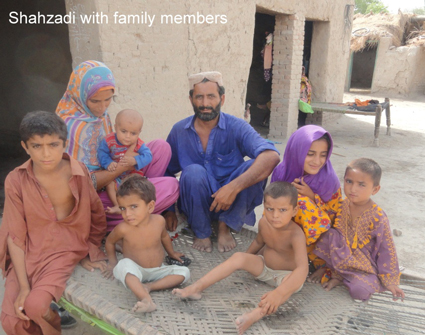Kitchen Gardening Helps Fight Poverty

2,500 women in Sindh and Balochistan started growing their own vegetables with assistance from the FAO Support for the Recovery of Agriculture Based Livelihoods of Vulnerable Farmers Affected by 2012 Floods of Sindh and Balochistan Provinces in Pakistan Project
“Vegetables helped me fight poverty. I was able to buy new cloths for my children, and my husband repaid a PKR 6,000 loan,” says Shahzadi, one of the beneficiaries of the FAO kitchen gardening project in Wazir Bux Khoso Village, Kashmor District of Sindh Province. “I even gave gifts to my neighbors and relatives — something that I could never afford before,” she adds.
Shahzadi belongs to a group of 25 women which practiced kitchen gardening together with support and guidance from FAO.
Shahzadi and her husband Abdul Nabi have eight children, all less than 10 years of age. Abdul Nabi has been earning income for his young family by growing wheat and rice on a rented 4-acre lot of land. “No matter how hard I tried, there was never enough money to make ends meet,” says the man.
The 2010 and 2012 floods dealt yet another blow on the already struggling family. Their village was flooded, and like many of their neighbors, Shahzadi’s family lost their house, standing crops and livestock. Abdul Nabi and Shahzadi were desolate.
Luckily for the family, Shahzadi was among the 2,500 women to whom FAO offered support through a DFID-funded kitchen gardening activity. Even though target households were mostly dependent on agriculture for their livelihoods, none of them had vegetable gardens before. A kitchen garden can supply up to half of all non-staple food needs and a significant share of vitamins and minerals for the household and is an important tool to enhance food security in vulnerable communities. This effort was part of the FAO Support for the recovery of agriculture based livelihoods of vulnerable farmers affected by 2012 floods of Sindh and Balochistan Provinces in Pakistan Project.
Together with its implementing partner, ACTED NGO, FAO explained to the participating women about the different approaches to kitchen gardening available to them, and offered to provide the seeds, fertilizer, and advice throughout the process. While in most FAO-supported areas, villagers prefer to develop individual kitchen gardens, residents of Wazir Bux Khoso Village decided to work collectively. A group of 25 women was formed, and FAO helped them find a 3.5-acre plot of land for gardening. To support the initiative, the owner of the land did not charge the women any rent.
Each of the participating women received a package of vegetable seeds and fertilizer sufficient for 1/8 acre of land. FAO also taught Shahzadi and her neighbors how to prepare soil, how to plant the seeds for best yields, and a variety of other techniques for vegetable husbandry. “It is simple, practical and interesting to grow and sell vegetables but I never knew it,” said Shahzadi. “Next year, I will use the skills and methods learned through the project in my own garden.”
Within one month, vegetables began bearing fruit. First, tomatoes and onions were ready to harvest, then — okra.
In her 1/8 acre share of the garden, Shahzadi produced enough vegetables for her family to use for more than three months. This amount of vegetables saved the family approximately 9,000 Rupees (US$90) worth of food. Additionally, Shahzadi put 60 kilograms of onion in storage for future use. Her children liked fresh vegetables, while Shahzadi enjoyed to work side by side with her neighbours, pluck vegetables and cook her own produce.
In addition to growing food for their families, for almost two months, the 25 women sold a pickup-van-full of tomatoes and okra every other day. While the community incurred 3,000 Rupees (US$30) in cost for the van rental and associated expenses, each pickup carried 110 bags of vegetables which sold for approximately 14,300 Rupees (US$143). By the end of the season, each participating household – including Shahzadi’s family, — earned around 14,000 Rupees (US$140).
After Shahzadi and her husband repaid their loan and made some other immediate use of their earnings, they still had 6,000 Rupees (US$60) left. They have great plans for this money. Shahzadi also plans to continue growing vegetables in her backyard, even when FAO support ends. “Kitchen garden provides a food safety net for the family, and it’s fun to cultivate, sell and store the vegetables which I grew with my own two hands,” says Shahzadi. Together with her husband, Shahzadi plans to increase the area of land use for growing vegetables next year and invest in good seed and fertilizer.
She hopes that one day her vegetable garden will help the family have the better future she has always been dreaming about.
